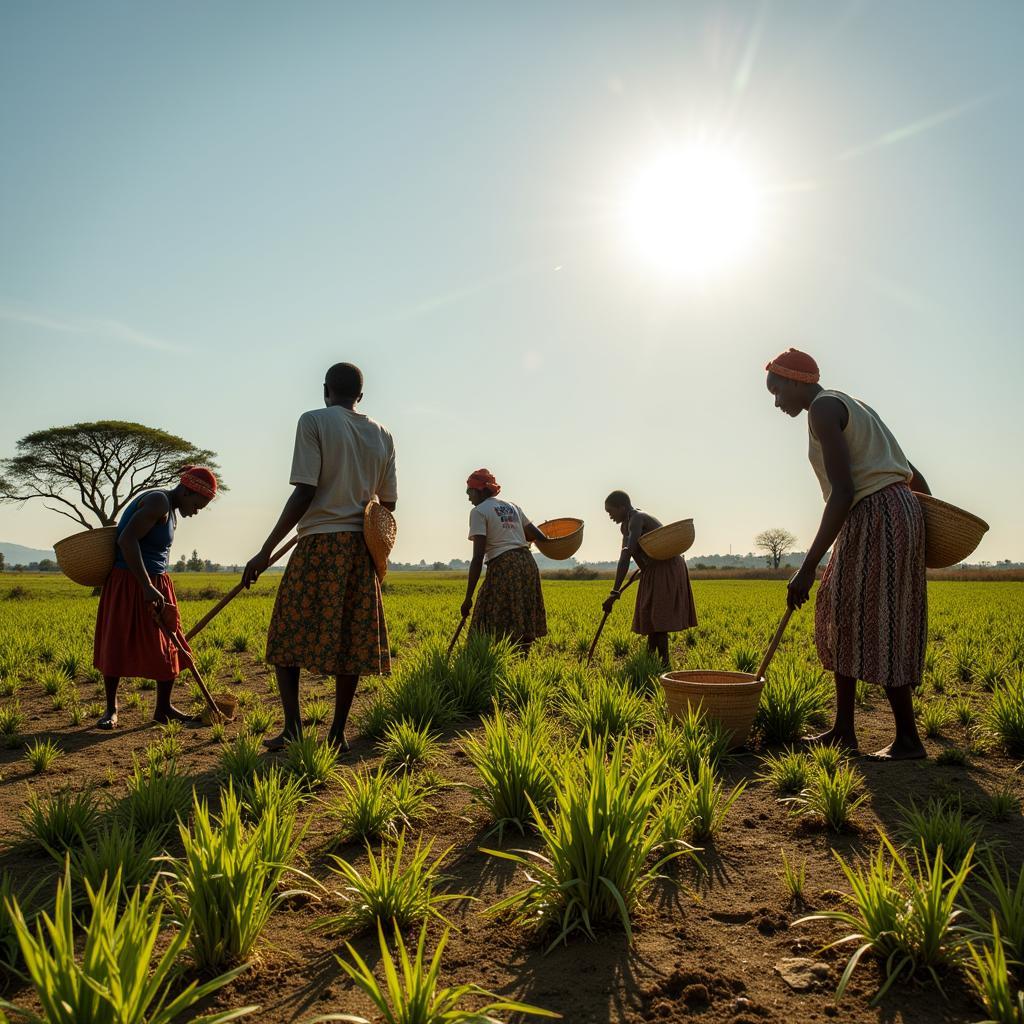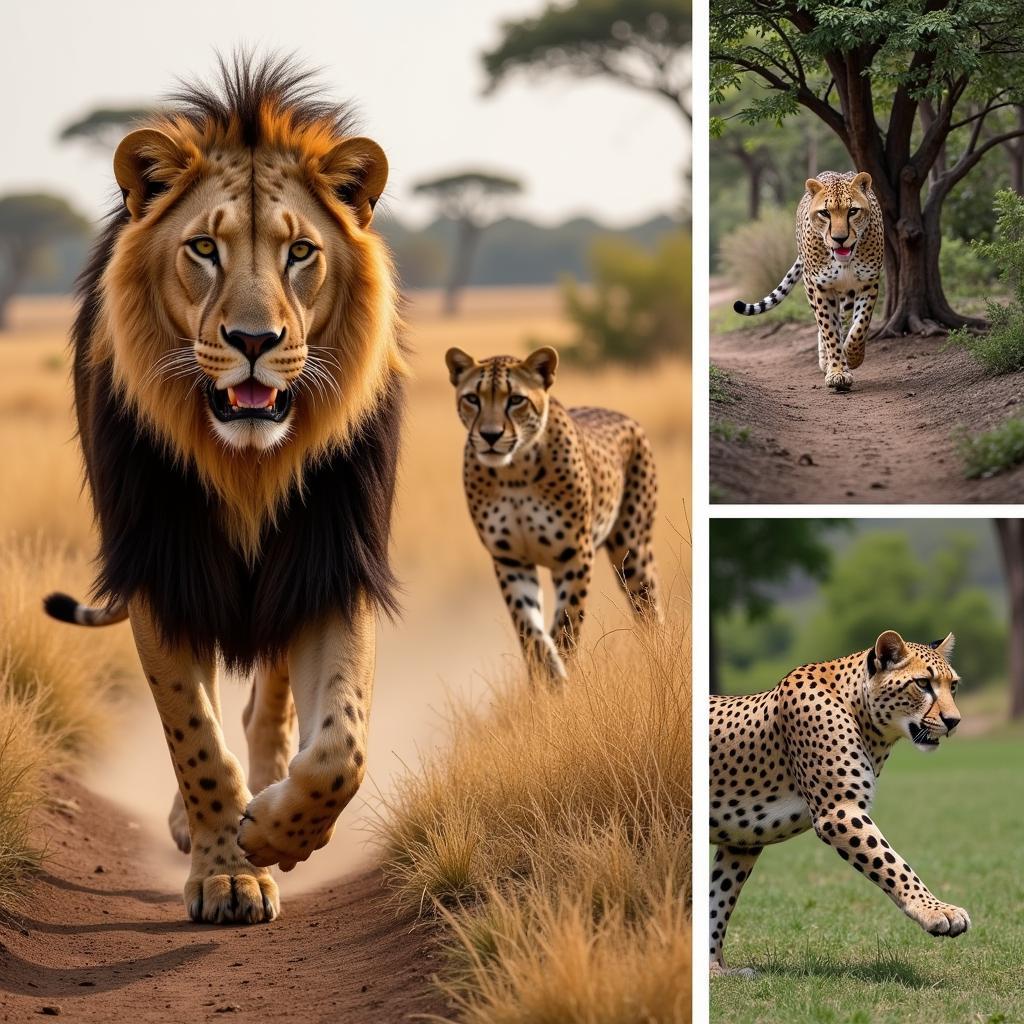Unveiling the Magic: Exploring African Countries Passing Through the Equator
The equator, an imaginary line encircling the Earth at 0 degrees latitude, slices across the African continent, gifting us with a diverse tapestry of landscapes, cultures, and wildlife. These “African countries passing through the equator” boast a unique geographical advantage, influencing everything from their climate and biodiversity to their cultural practices and traditions. Let’s embark on a captivating journey to discover the allure of these equatorial nations.
The Equatorial Advantage: A Glimpse into Unique Climates and Ecosystems
The equator’s influence on these African countries is undeniable. Straddling this line grants them a predominantly warm and humid climate, with minimal variation in temperature throughout the year. This consistent warmth fuels exceptional biodiversity, making these countries home to some of the planet’s most vibrant and unique ecosystems.
For instance, the Congo Basin, often dubbed the “lungs of the world,” thrives in this equatorial climate. This vast rainforest, shared by several nations, plays a crucial role in regulating the global climate while harboring an astonishing array of plant and animal species found nowhere else on Earth.
Cultural Kaleidoscope: Traditions Shaped by the Equator
Beyond its impact on the environment, the equator’s influence extends to the cultural practices of these African nations. The rhythm of life often revolves around the consistent cycle of day and night, with agriculture deeply intertwined with the two rainy seasons experienced annually. This unique equatorial rhythm has shaped traditional beliefs, celebrations, and daily routines, creating a vibrant cultural tapestry.
 Farmers Harvesting Crops in Rural Africa
Farmers Harvesting Crops in Rural Africa
Furthermore, the equatorial location has historically positioned these countries as crossroads for trade and cultural exchange. From the ancient spice routes to modern-day commerce, their strategic location has fostered a blend of influences, shaping their languages, cuisines, and artistic expressions.
Spotlight on the Nations: A Closer Look at the Equatorial Countries of Africa
There are a total of seven African countries fortunate enough to be graced by the equator’s presence. These include:
- Sao Tome and Principe
- Gabon
- Republic of the Congo
- Democratic Republic of the Congo
- Uganda
- Kenya
- Somalia
Each nation possesses its own unique charm and cultural heritage. For example, Kenya is renowned for its wildlife safaris and the Maasai Mara National Reserve, while Uganda captivates with its lush landscapes and the opportunity to track mountain gorillas. Meanwhile, Somalia offers a glimpse into a rich cultural heritage shaped by centuries of trade along the Indian Ocean.
Navigating the Globe: Exploring Other Equatorial Crossings
The equator’s influence extends far beyond the African continent. It traverses numerous countries across the globe, each with its own fascinating story to tell. For those eager to expand their understanding of these equatorial regions, exploring resources like “African countries through which tropic of cancer passes” or “African countries crossed by prime meridian” can offer intriguing insights into the geographical and cultural diversity of our planet.
Embracing the Equatorial Spirit: A Journey of Discovery
From the dense rainforests of the Congo Basin to the vibrant cultural celebrations, the “African countries passing through the equator” offer a glimpse into a world brimming with life and diversity. As we delve deeper into understanding these nations, we uncover a tapestry woven with resilience, adaptability, and a profound connection to the natural world. It’s an invitation to embrace the equatorial spirit and embark on a journey of discovery, appreciation, and respect for the beauty and richness of our planet.
Frequently Asked Questions About Equatorial African Countries
1. What is special about countries located on the equator?
Countries situated on the equator experience a unique set of geographical advantages, including a consistently warm and humid climate, leading to high biodiversity and unique ecosystems.
2. Do all countries on the equator have rainforests?
While the equator is known for its lush rainforests, not all countries along this line possess them. Factors like altitude and proximity to coastlines influence the type of ecosystem present.
3. How does the equator impact the culture of African countries?
The equator’s influence on African cultures is profound, shaping agricultural practices, traditional beliefs, celebrations, and the overall rhythm of life.
4. Which African country is most famous for its wildlife?
Kenya is globally recognized for its exceptional wildlife and stunning safari experiences, with the Maasai Mara National Reserve being a major highlight.
5. Where can I learn more about the economic development of these African nations?
Resources like “African economic community regional organizations africa” provide valuable information on the economic landscape and development initiatives within these countries.
Exploring Further: More Insights into Africa’s Diverse Landscape
For those intrigued by Africa’s geographical wonders, diving into topics such as “40 African counteiea in 5 mint buzzfeed” can be an engaging way to broaden your knowledge of this captivating continent.
Need assistance planning your African adventure? Contact us!
Phone: +255768904061
Email: kaka.mag@gmail.com
Address: Mbarali DC Mawindi, Kangaga, Tanzania
Our dedicated team is available 24/7 to answer your questions and help you discover the magic of equatorial Africa.
